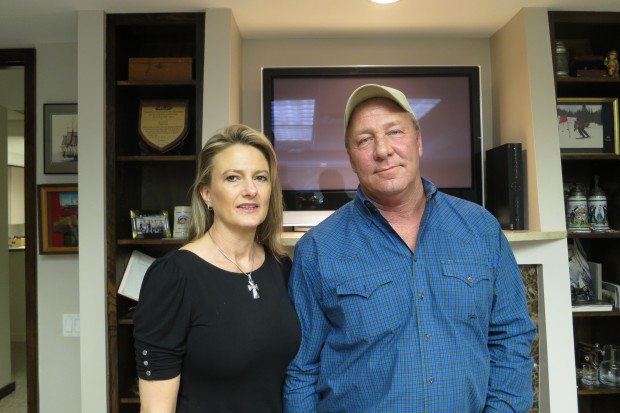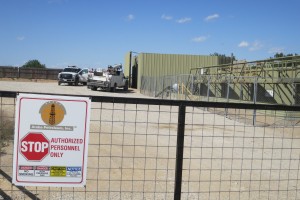What a Multi-Million Dollar Lawsuit Could Mean for Fracking and Its Opponents

Mose Buchele/StateImpact Texas
The Parrs says drilling near their property made them sick. A Dallas jury agreed, awarding them nearly $3 million.
When a Dallas jury awarded a North Texas family $3 million for damages from natural gas drilling near their property last week, the Internet went wild. Opponents of hydraulic fracturing called it a landmark, a game changer, the first “anti-fracking” lawsuit to result in a jury award. In truth, the case involved not just fracking, but all the operations that go along with natural gas production.
It was brought by the the Parr family. They sued a drilling company, Aruba Petroleum, one of several gas companies that were operating near their North Texas ranch. The Parrs claimed they were poisoned by Aruba’s activities.
Their troubles started in late 2008. Lisa Parr had just married Bob and moved with her daughter, Emma, to his ranch in Wise county.
“I started feeling bad,” Lisa Parr recalls. “I blew it off as the flu.”
But as several months went by, she still felt sick.
“I had a rash throughout my body, my lymph node stuck out in my neck like the size of pecans,” she says. “There was four of them on each side.”

Courtesy of Bob and Lisa Parr
Emma Duvall, Lisa Parr's daughter, had to go to the hospital because of her symptoms.
Her husband eventually started experiencing illness as well. “Nose bleeds, rashes, breathing difficulties,” Bob Parr says. “Eye problems, hearing problems.”
And it hit their daughter, too. “She would have rashes, they would have stomach problems,” Lisa says. “Vision, hearing — complete central nervous system problems.”
The handful of doctors treating Lisa – she says there were eight at one point – said the cause was something in the environment. So the family talked to neighbors. One of them was having difficulties with local drilling activity and had kept a log of problems, like spills and leaks, at nearby natural gas sites.
To Lisa Parr, the dates of those accidents looked familiar.
“Those were the dates I was at the emergency room or at a doctor’s office being packed down in ice,” she says.
The family ended up suing several nearby drilling companies, and all but one of those suits was dismissed or settled out of court. Bob Parr says that one remaining company, Aruba Petroleum, never offered to settle.
“They were kind of the main player there next to our house,” Parr says.
He believes it was Aruba that was responsible for the family’s illness. Last week, a jury agreed.
What Does it Mean?
“It’s rare for any case to go to the jury in a civil case,” says Tom McGarity, a Professor of Environmental Law at the University of Texas at Austin. “Just because most settle.”
When it comes to drilling companies, those settlements often include gag orders. That means the people involved can’t talk about their experiences, or, more than likely, show evidence to others of medical distress, like the photos the Parrs provided us with for this story.But in the case of Aruba Petroleum, the drilling company apparently decided to draw a line.
“As it turns out, that was not necessarily a very good decision,” McGarity says.
In a statement released after the verdict, the company expressed disappointment, saying, in part, that it’s in compliance with Texas air quality rules.
But that’s another reason this case is getting attention: it doesn’t necessarily matter whether the company is in compliance. The Parrs filed what’s called a nuisance claim, the same kind of suit that’s sometimes brought against unruly neighbors even if they haven’t been charged with a crime.
The Parrs had to show not that the company was breaking the law (though they say it was), but that it was behaving unreasonably as a neighbor.
These types of claims are increasing in parts of the country where oil and gas drilling occurs near peoples’ homes, says Hannah Wiseman, an Assistant Professor of Law at Florida State University.
“Because they allow this very broad argument that property use has been interfered with, and I think they fill in what some people see as gaps in the regulatory regime,” Wiseman says.

Mose Buchele/StateImpact Texas
An Aruba Petroleum drilling and production site up the street from the Parr's ranch.
Wiseman expects more nuisance claims across the country, especially in places like Texas where regulations are relatively lax.
Brad Gilde, one of the Parrs’ lawyers, agrees. He says he’s already getting calls from other property owners.
As for the Parrs, they say they never set out to fight fracking. In fact, they don’t oppose the drilling technique (surprising, perhaps for a family that appeared in the anti-fracking documentary Gasland II), just irresponsible drillers. But the whole experience has changed how Bob Parr thinks about it, even though he’s got a few leases with oil and gas companies himself.
“I wake up all the time thinking, ‘If this is happening to us, what’s my lease doing to someone else?’” he wonders.
A judge still needs to sign off on the Jury’s verdict, and if that happens, Aruba Petroleum is expected to appeal.

![Bob Parr says "I wake up all the time thinking, 'If this happening to us, what’s my [oil and gas] lease doing to someone else?'”](http://stateimpact.npr.org/texas/files/2014/05/image-1-300x225.jpeg)

